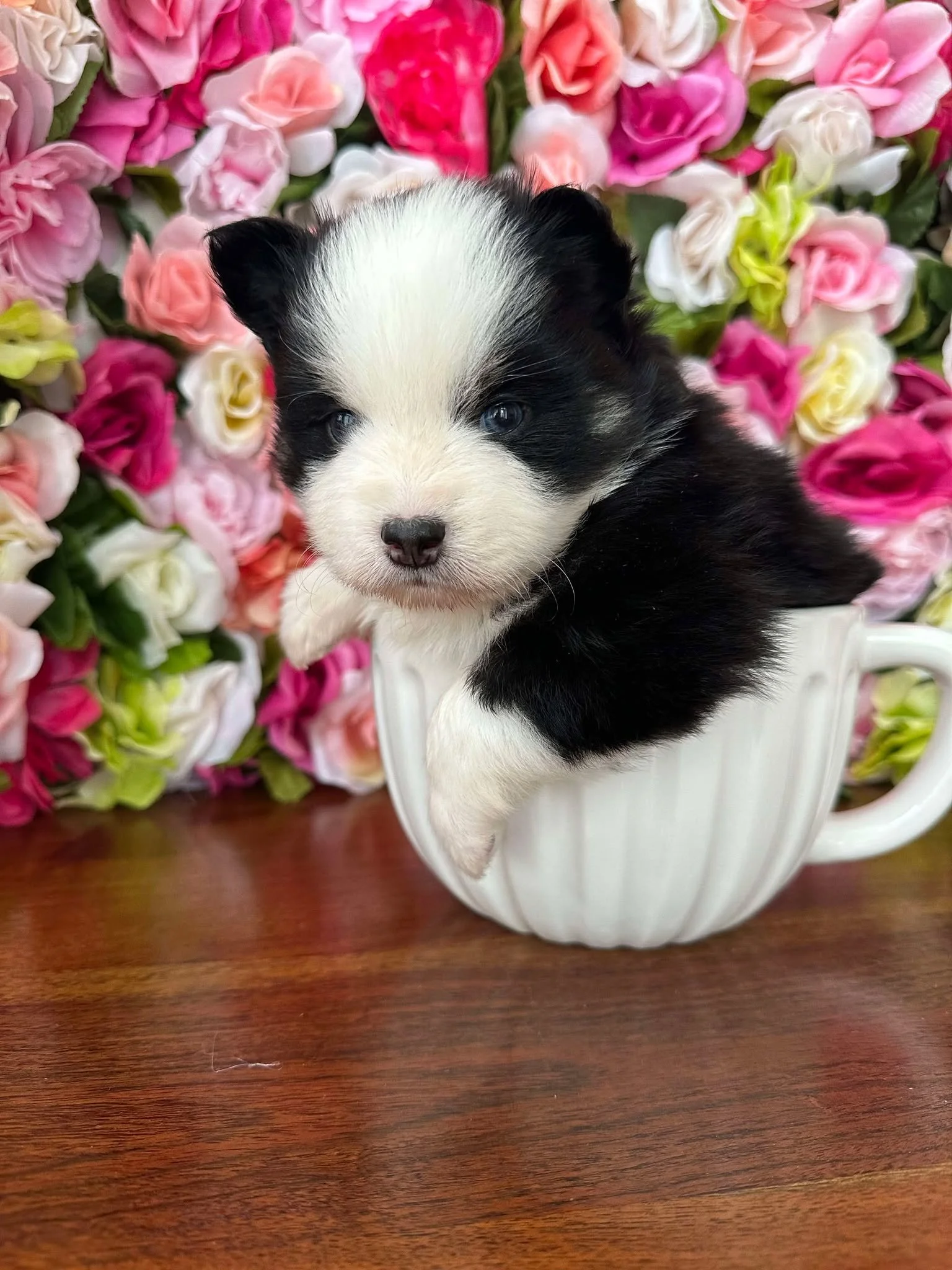Pet Owners: Why You Shouldn't Search for 'Teacup' Puppies
Bringing a puppy into your home should be a joyous and thoughtful process. However, the rise of certain trends, like the pursuit of 'teacup' puppies, has turned what should be a heartfelt journey into a dangerous gamble. The term 'teacup' has become a 🚩 red flag for scams and significant health issues. Today, we want to shed light on why you should steer clear of this trend and instead focus on the true hallmarks of a responsible and fulfilling pet adoption: health, structure, and temperament.
The Scam Behind 'Teacup' Puppies
This precious 4 wk old puppy image provided by Windy City Pomskies (it’s not a teacup Pomsky).
The allure of 'teacup' puppies is undeniable – tiny, adorable dogs that can fit in the palm of your hand. However, this appeal has not only attracted genuine pet lovers, but also unscrupulous breeders and scammers. The term 'teacup' is not recognized by reputable canine registries. It's a marketing gimmick used to inflate prices and attract buyers who may not be aware of the risks involved.
Scammers often exploit the term to sell sickly or underage puppies that are passed off as 'teacup' breeds. They may post enticing pictures online, only to vanish once they receive your payment. Unfortunately, many well-intentioned buyers end up heartbroken, either due to financial loss or the grief of losing a fragile puppy to health complications soon after purchase. Trustworthy breeders prioritize the well-being of their dogs over profit and will not market puppies using this deceptive term.
The Health Issues of Tiny Puppies
Even when 'teacup' puppies are not a scam, their tiny size often comes with a host of health problems. These dogs are bred to be unnaturally small, which can lead to serious congenital and developmental issues. Common health problems in these tiny dogs include:
Hypoglycemia: Tiny puppies often struggle to maintain proper blood sugar levels, which can lead to seizures and even death if not managed meticulously.
Heart Defects: Smaller dogs are more prone to heart problems, which can significantly shorten their lifespan.
Bone Fragility: The smaller the dog, the more delicate their bones. A minor fall or mishandling can result in fractures.
Respiratory Issues: Their small size can lead to underdeveloped lungs, causing chronic breathing problems.
Digestive Troubles: Tiny dogs often have sensitive digestive systems, making them prone to issues like chronic diarrhea and vomiting.
The Case of Pomskies
The popularity of Pomskies, a hybrid breed between Pomeranians and Siberian Huskies, has also seen a rise in misleading 'teacup' claims. According to the American Pomsky Kennel Club (APKC) breed standards, the term 'teacup' is not recognized. Instead, breeders should use the term 'toy' to refer to the smaller size category. A 'toy' Pomsky is a legitimate and ethical size classification, whereas 'teacup' is a misleading term. Here’s a link to the American Pomsky Kennel Club 2023 Breed Standard.
Prioritizing Health and Temperament
Instead of focusing on how tiny a puppy can be, prospective pet owners should prioritize the health and temperament of their future furry friend. Here are some essential aspects to consider:
Health Screenings: Look for breeders who conduct comprehensive health screenings on their breeding dogs. OFA testing for luxating patellas (bad knees are more common in smaller breeds) and other genetic conditions can help ensure your puppy comes from a healthy lineage.
Veterinary Care: A responsible breeder will provide veterinary care for their puppies, including vaccinations, deworming, and regular health check-ups, with a copy of the documentation for each of the vet visits.
Temperament: The personality of a dog is crucial for a happy household. Reputable breeders will socialize their puppies and can provide insights into the temperament of the puppy and its parents. This information can help ensure the dog's temperament matches your lifestyle and expectations.
Breeder Transparency: A good breeder will be transparent about their breeding practices and will welcome questions about the puppy's health, parents, and living conditions. They should also provide a health guarantee and be willing to take the puppy back if things don’t work out.
If a breeder is focused on how small of a size they can breed, then this would be a breeder you would want to avoid.
“As the parent kennel club, we take the stance that females under 10lbs should not be bred. ”
Finding the Right Fit
Instead of searching for the smallest dog possible, focus on finding the individual Pomsky puppy that fits well with your lifestyle. Consider factors like activity level, grooming needs, and potential health issues associated with specific breeds. Take your time to research and connect with reputable breeders. Pomskies are not a breed for everyone, due to their shedding and energy levels.
For those specifically interested in Pomskies, it is crucial to consult the APKC's list of ethical breeders. These breeders adhere to the proper standards, including using appropriate size terminology like 'toy' rather than 'teacup,' ensuring you get a healthy and well-bred Pomsky puppy.
Adopting a puppy should be a thoughtful and deliberate process. By prioritizing health, temperament, and responsible breeding practices, you can ensure that your new furry friend will be a happy and healthy addition to your family. Let’s move away from the dangerous and often heartbreaking pursuit of 'teacup' puppies and focus on what truly matters – the well-being and happiness of our pets.

